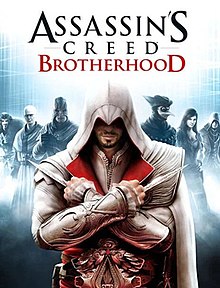
Back أساسنز كريد: برذرهود Arabic اساسنز كريد: برذرهود ARZ অ্যাসাসিন'স ক্রিড: ব্রাদারহুড Bengali/Bangla Assassin's Creed: Brotherhood Catalan Assassin's Creed: Brotherhood Czech Assassin's Creed: Brotherhood Danish Assassin’s Creed: Brotherhood German Assassin's Creed: Brotherhood Greek Assassin's Creed: Brotherhood EO Assassin's Creed: Brotherhood Spanish
| Assassin's Creed: Brotherhood | |
|---|---|
 | |
| Developer(s) | Ubisoft Montreal |
| Publisher(s) | Ubisoft |
| Director(s) | Patrick Plourde |
| Producer(s) | Vincent Pontbriand |
| Designer(s) | Steven Masters |
| Programmer(s) | Stéphane Girard |
| Artist(s) | Mohamed Gambouz Wilson Mui |
| Writer(s) | Patrice Désilets Corey May Jeffrey Yohalem |
| Composer(s) | Jesper Kyd |
| Series | Assassin's Creed |
| Engine | Anvil |
| Platform(s) | |
| Release | |
| Genre(s) | Action-adventure, stealth |
| Mode(s) | Single-player, multiplayer |
Assassin's Creed: Brotherhood is a 2010 action-adventure game developed by Ubisoft Montreal and published by Ubisoft.[1][2] It is the third major installment in the Assassin's Creed series, and the second chapter in the "Ezio Trilogy", as a direct sequel to 2009's Assassin's Creed II. The game was first released on the PlayStation 3 and Xbox 360 in November and December 2010 and was later made available on Microsoft Windows in March and June 2011. A remastered version of Brotherhood, along with Assassins's Creed II and its sequel, Assassin's Creed: Revelations, was released as part of The Ezio Collection compilation for the PlayStation 4 and Xbox One on November 15, 2016, and for the Nintendo Switch on February 17, 2022.
The plot is set in a fictional history of real-world events and follows the millennia-old struggle between the Assassins, who fight to preserve peace and free will, and the Templars, who desire peace through control. The framing story is set in the 21st century and features series protagonist Desmond Miles who, using a machine known as the Animus, relives the memories of his Assassin ancestor, Ezio Auditore da Firenze, to find a way to avert the 2012 apocalypse. The main story takes place during the Italian Wars, spanning the years 1500–1507, and continues from the events of Assassin's Creed II, as Ezio takes the fight against the Templars (led by the powerful Borgia family) to Rome, where he attempts to rebuild the Assassin Brotherhood in Italy and liberate the city from the Borgias' control.
Brotherhood features an open world and is played from the third-person perspective, with a primary focus on using Desmond's and Ezio's combat, climbing and stealth abilities to eliminate targets and explore the environment. As Ezio, players can freely explore Rome to advance the narrative, or complete a variety of side missions unrelated to the main storyline. The game introduces a multiplayer component to the series, in which players assume the role of Templars in training. A number of downloadable content (DLC) packs were released to support Brotherhood, including The Da Vinci Disappearance, a story expansion set during the events of the single-player campaign.
Upon release, the game received critical acclaim, with praise directed at its setting, new content, gameplay improvements over its predecessor and the new multiplayer mode. The narrative was also positively received, although it was generally seen as inferior to that of Assassin's Creed II. Despite this, like its predecessor, it is considered one of the greatest video games ever made. The game won multiple awards including a BAFTA award for Best Action Game. It was also commercially successful, shipping 7.2 million units by May 2011. The final installment in the Ezio Trilogy, Assassin's Creed: Revelations, was released in November 2011.
- ^ Wilde, Tyler (March 28, 2011). "Assassin's Creed Brotherhood Review". PC Gamer. Archived from the original on April 25, 2016. Retrieved September 4, 2016.
- ^ Shea, Cam (November 16, 2010). "Assassin's Creed Brotherhood Review". IGN. Archived from the original on October 11, 2016. Retrieved September 4, 2016.